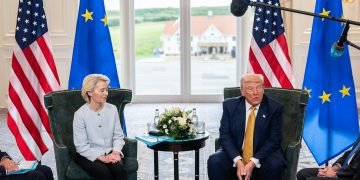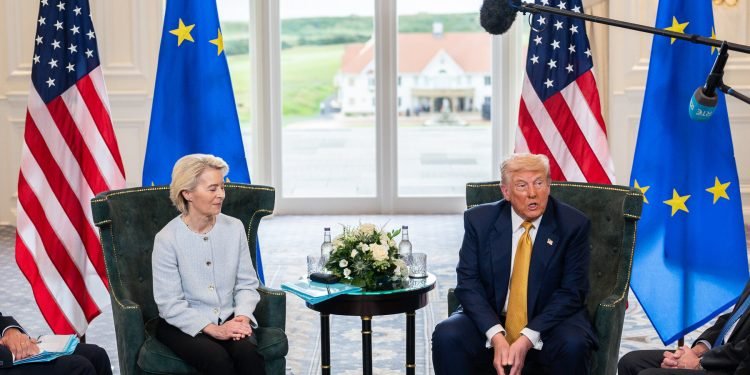By Maria Kalamatas | August 7, 2025
Brussels, August 7 —
After weeks of speculation, the European Commission announced today it would delay any retaliatory tariffs on U.S. imports for at least six months, opting for what officials called “strategic restraint” amid growing pressure from business leaders across the bloc.
The move comes just days after the U.S. administration reimposed duties on European steel and aluminum, triggering calls in Brussels for a response. But for now, Europe is holding its fire.
“We’re choosing stability over escalation,” said EU Trade Commissioner Helena Braun during a press briefing this morning. “Businesses have made it clear: more tariffs now would do more harm than good.”
❚ Industry groups push for diplomacy
The decision follows weeks of intense lobbying by key sectors — particularly automotive, aerospace, and consumer electronics — all of which rely heavily on transatlantic supply chains.
Executives from over 40 multinational firms submitted a joint letter to the Commission earlier this week, warning that reciprocal duties could disrupt procurement, delay Q4 production, and raise end-user prices.
“No one wins in a tariff race,” said Markus Ehlers, logistics director for a major German machinery exporter. “We need reliability, not new hurdles.”
❚ Logistics players welcome the pause
Freight forwarders and customs brokers have also expressed relief. Several ports, including Hamburg, Rotterdam, and Antwerp, reported an uptick in inquiries from importers concerned about cost uncertainty and rerouting options.
“This gives us breathing room,” noted Sophie van Dijk, a customs consultant based in the Netherlands. “Everyone was pricing in extra duties that may not happen — now we can pause and reassess.”
❚ U.S. reaction: muted but cautious
Washington has so far offered no formal comment on the EU’s delay, but trade officials have privately described it as “a constructive signal.” Sources close to the Biden administration said the White House is still considering sectoral exemptions that might ease tensions further.
Meanwhile, European officials confirmed that a six-month review window has been set, during which tariff impact assessments will be conducted jointly with affected industries.
❚ What this means going forward
For now, the EU’s move reduces the risk of a broader trade war, though underlying tensions remain. Businesses on both sides of the Atlantic are calling for renewed dialogue — and faster action to rebuild predictability in logistics and trade.























